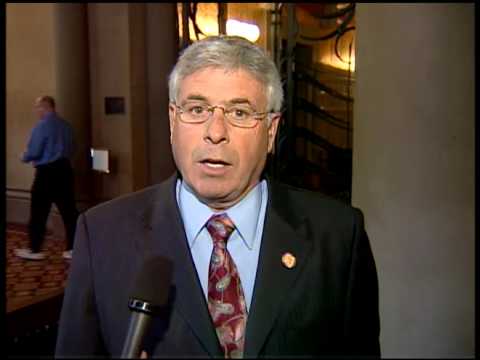Senate Acts Quickly to Pass New ‘Power for Jobs’ Program
Darrel J. Aubertine
May 5, 2010
-
COMMITTEE:
- Legislative Commission on Rural Resources
Economic Benefit Power Program to be streamlined and permanent with more power available
New program builds on past success retaining jobs to create new jobs and economic growth
ALBANY (May 5, 2010)—The New York State Senate, following the recommendation of Energy and Telecommunications Committee on Monday, moved immediately to pass legislation 58-3 last night sponsored by Sen. Darrel J. Aubertine to create a permanent ‘Power for Jobs’ program that will streamline and improve the state’s low cost power for economic development efforts.
“By passing legislation today that is based on the recommendations of employers and economic development experts, in advance of the May 15 deadline and with bipartisan support, we are demonstrating the Senate’s commitment to preserving and creating jobs statewide,” said Sen. Aubertine, vice chair of the Senate Energy & Telecommunications Committee. “In this time of budget constraints and economic crisis, this is legislation that will expand an already successful program and foster the economic growth we need to emerge from these difficult times stronger.”
The new Economic Benefit Power Program (S.7573-A) would continue to protect more than 250,000 jobs statewide that are covered by Power for Jobs and include additional power allocations to maximize the program’s potential. It would also make the program permanent, with available seven-year contracts, giving businesses the certainty they need to make long term investments and create jobs.
This bill was crafted with the input of employers and economic development experts around the state through the Powering New York’s Future Initiative, a series of statewide discussions with businesses and other stakeholders used to determine actions the Legislature could undertake to better use the resources of the New York Power Authority to make New York more business-friendly.
“Employers enrolled in this program and economic development groups have long said that the state’s resource of low cost power from NYPA could do more for our economy,” Sen. Aubertine said. “We went to these businesses, not-for-profit employers and other stakeholders in Buffalo, Niagara, Long Island, Syracuse, Kingston, Oswego and Massena and reached out to organizations across the state, and their input was used to develop this legislation. All too often, here in Albany we pass legislation and ask businesses to back into it and tell us what they think after it’s already law. In this instance, we took this important legislation and brought it to the people and businesses of this state to make sure we got it right.”
Among the organizations which have expressed support for this legislation are the Business Council of New York State, the National Federation of Independent Business, the Manufacturer’s Association of Central New York, Consumers for Affordable and Sustainable Energy, the Greater Syracuse Chamber of Commerce, the Metropolitan Development Association, the Center for Economic Growth, the Buffalo Niagara Partnership, and the Plattsburgh North Country Chamber of Commerce.
This bipartisan Senate bill takes a comprehensive approach to using low cost power and the resources of the New York Power Authority to maximize the retention and creation of jobs across New York State. It would build on previously successful programs such as Power for Jobs by incorporating the needs of employers to ensure even better results.
Critically important is that the program will no longer require annual approval of the legislature and provides for a mutual “evergreen” option for the state and businesses to sign one-year extensions to be added to the end of a seven-year deal for job retention and investment. The current programs would remain in place until July 1, 2011, at which point they will be phased out and replaced by the new program.
The legislation also makes an additional 455 megawatts of power available to help create jobs, while limiting the impact on Rural and Domestic Power allocations that subsidize farms, businesses and homeowners in communities receiving hydropower benefits. Those benefits would remain at 2009 levels of up to $70 million for 2011 and 2012, with the cap dropping to $60 million in 2013, $50 million in 2014, and $40 million in 2015, where it would be frozen moving forward.
The new program would be open to businesses (except retail) and non-profits, including current NYPA participants that are in substantial compliance with contractual commitments. Among the criteria for eligibility that will be factored in are:
· the significance of power costs for the employer;
· the extent that benefits will result in new investment and the willingness of applicant to commit to new investments;
· size of applicant’s payroll, jobs created or retained and willingness to commit to job targets;
· risk that facility could close or relocate, causing job loss and the facility’s local economic significance;
· whether the not for profit provides critical services or substantial benefits to community;
· prior energy audits and/or efficiency investments and a willingness to become more efficient;
· consistency with the state’s energy plan, performance under prior NYPA programs, and state and local development plans.
No single criteria, standing alone, would determine if an employer receives benefits, but each shall be weighed in a consistent manner into a comprehensive review of all relevant factors. The bipartisan legislation would expand the existing four-member Economic Development Power Allocation Board to nine members, to determine eligibility and enroll employers in the new program. Energy efficiency also remains central to this legislation, beginning New York Power Authority free energy audits to recipients to improve efficiency and perform weatherization worth at least $10 million annually.
-30-
Share this Article or Press Release
Newsroom
Go to NewsroomSen. Aubertine meets with Hannibal School District Students
March 22, 2010

Aubertine Pushes for Property Tax Relief
March 18, 2010
